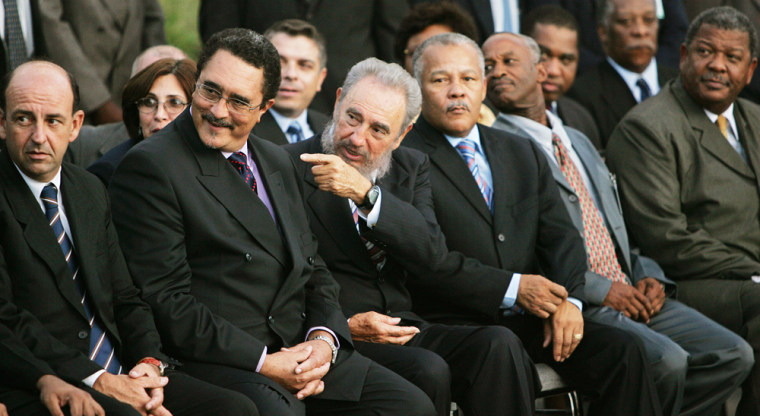Looking for foreign aid after his election, Haitian President Rene Preval stopped in Havana. When Trinidad’s prime minister needed heart surgery, he twice turned to Cuban doctors. And when the U.N. held its annual vote to denounce the U.S. trade embargo on Cuba, the Caribbean Community trade bloc gave its unanimous support.
In sharp contrast to the bitter U.S.-Cuba divide, relations between the Cuban government and the rest of its neighbors have never been warmer — a situation highlighted by reactions to the surgery that required Fidel Castro to relinquish power temporarily.
Caribbean leaders, even from nations that had Cold War differences with Cuba, sent get-well-soon messages to Castro, while the U.S. government offered encouragement to the ailing leader’s opponents and Cuban exiles danced in the streets of Miami.
“We pray for President Castro and we wish him God’s blessings,” said Prime Minister Kenny Anthony of St. Lucia.
'Long-standing friend'
The friendly relations stem in part from small-state admiration for Castro’s defiance of the United States, which also has strong ties throughout the region. But there’s also gratitude for Cuban assistance, in medical care and education, to Caribbean nations despite the communist government’s financial struggles.
“Cuba has been a long-standing friend to the entire Caribbean,” said Barry Collymore, spokesman for Grenadan Prime Minister Keith Mitchell.
Cuba hasn’t always been regarded with such benevolence in the region. In 1983, President Reagan ordered the invasion of Grenada, seeking to oust a leftist government allied with Cuba and the Soviet Union. Seven Caribbean nations, including Dominica and Trinidad and Tobago, sent troops in support of the invasion, in which 24 Cuban advisers were killed.
Now Grenada has a centrist government and has received help both from Cuba and the United States after the island was devastated by Hurricane Ivan in 2004.
In December, when Castro made one of his increasingly rare trips abroad, the Cuban leader was received with near reverence from regional leaders during a Caricom trade bloc summit in Barbados. They enthusiastically applauded his speech and listened intently to a DVD promoting Operation Miracle, a program funded by Cuba and Venezuela that has provided free eye surgery to more than 12,000 people.
“The people of the Caribbean community can always count on Cuba’s respect and friendship,” Castro said at the time.
Medical, educational assistance
Under pressure from the U.S. embargo, Cuba has little to offer beyond scholarships to its universities, medical care and the doctors and nurses it dispatches throughout the region to fill local shortages. Denzil Douglas, the prime minister of St. Kitts and Nevis and the current Caricom chairman, said more than 1,300 students from member nations are studying in Cuba while more than 1,000 doctors, nurses and other technicians are working throughout the region.
The communist country has also become a destination for those seeking treatment. Trinidad Prime Minister Patrick Manning had a heart valve replacement surgery there in 1998 and returned in 2004 to have a pacemaker implanted. This week, he issued a statement extending Castro his “best wishes for a prompt recovery.”
An exception to the pro-Castro sentiment in the region is in Puerto Rico, home to a large population of Cuban exiles who retain their anger and sorrow over their losses in the revolution. Some in the U.S. island territory also fear that a Cuba without Castro — if the U.S. ever lifts the embargo — would siphon away investment and tourists from Puerto Rico.
Puerto Rican Gov. Anibal Acevedo Vila dismissed that concern this week, saying the Spanish-speaking island could train the Cubans “how to work in a free market” and an increase in tourism to the island would spur overall Caribbean tourism.
